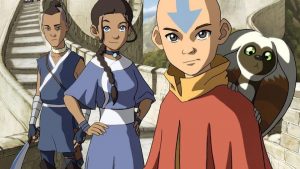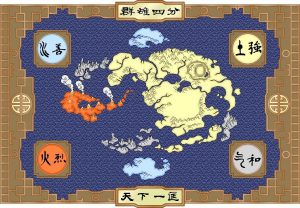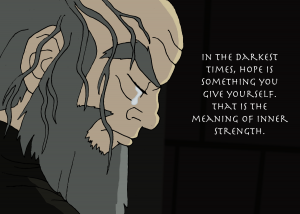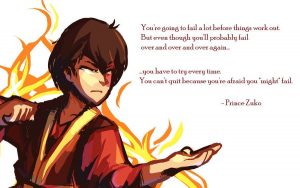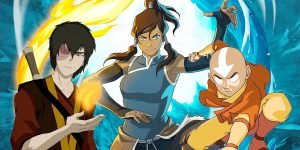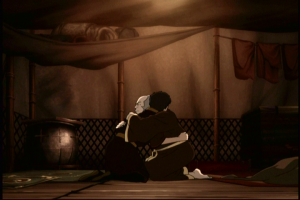“Then, everything changed when the Fire Nation attacked.”
Released back in 2005, Avatar: The Last Airbender was first aired on Nickelodeon. Created by Michael Dante DiMartino and Bryan Konietzko, Avatar: The Last Airbender ran for three years until its conclusion.
Set in an Asiatic universe, Avatar: The Last Airbender infused a myriad of Asian cultures and practices in its magnificent world-building. Deriving its key elements from the school of Chinese Martial Arts called ‘bending’, characters from South-East Asia to the nomadic Inuit tribe are represented throughout the series.
Focusing primarily on the classical elements inspired by traditional Asian cultures, the world of Avatar is divided into four major nations; The Fire Nation, the Water Tribes, the Earth Kingdom, and the Air Nomads. Each nation has some gifted individuals who can telekinetically control and manipulate their nation’s element through martial arts.
Like most Asian cultures, Avatar: The Last Airbender also incorporates a powerful character who is responsible for maintaining peace and harmony. In the show, the titular Avatar is responsible for maintaining the power structure among the nations. The Avatar is a supremely powerful character who can master the bending of all the four classical elements while actively trying to avoid combat.
When an Avatar dies, his/her spirit gets reincarnated in one of the nations. This cycle kept repeating itself, till the Fire Nation attacked the Air Nomads to capture Aang, the new Avatar. As a child, Aang fled his country and hibernated in the South Pole to be revived after a hundred years by two characters from the Water Tribe.
Set against the backdrop of a World War, Avatar: The Last Airbender is one of those rare animated shows which cater to kids, teenagers, and adults. Touching upon the themes of genocide, authoritarianism, the brutality of a police state, war, suffering, and redemption, Avatar: The Last Airbender is one of the finest shows created in the animated medium.
Since its conclusion in 2008, Avatar: The Last Airbender has attained a cult following. Critically acclaimed when it was aired, the show still musters up enough fanbase to pass it to the next generation of audience. It has been 12 years since the last episode of the show was aired. The question is, why is Avatar: The Last Airbender still massively popular?
As the lockdown measures became more severe due to the COVID-19 outbreak, Netflix decided to run the episodes of Avatar: The Last Airbender on its platform in May 2020. The old fans who watched it on Nickelodeon have been nothing short of ecstatic. As a result, a lot of new members have joined the fanbase, making Avatar: The Last Airbender one of the most-watched shows in the United States.
One of the reasons behind the increased popularity of Avatar is nostalgia. When Cable TV was at its peak, most of the millennials managed to watch the show on Nickelodeon. Now, caged up in their houses, the sudden surge in Avatar’s popularity stems from the millions of fans who once watched the show when they were kids or pre-teens.
Is nostalgia enough to make Avatar: The Last Airbender the most-watched show in a span of weeks? There have to be a lot many other factors which make the graphic tone and underlying morals of Avatar still relevant after 12 long years.
The show is set against a backdrop of war and suffering. As the Fire Nation ravages the Air Nomads and commits genocide, the show gets dark and intense soon enough. How does it resonate today? As the world is fighting a battle with the virus, suffering and losses have become the norm. Millions of lives affected, millions of lives lost. This is the great war of our times, and the teachings from Avatar: The Last Airbender might give us the much-needed respite.
1. Hope is something you give yourself. That is the meaning of inner strength.
Long periods of isolation, a disruption in our normal lives can wreak havoc on our beliefs, health, and relationships. The goals we set to achieve earlier might seem far-fetched during these times.
In the show, Uncle Iroh is one of the most loved characters for his wisdom and kindness. Once a ruthless general, he lost his only son in the war. Next in line to be the ruler of the Fire Nation, Uncle Iroh gave it up for a quiet life.
His wisdom stems from a tragic past. Instead of wallowing in self-pity, he took the course of his life in his own hands. His role in shaping up Aang and Zuko can surely teach us a few lessons to not lose hope and keep believing in ourselves.
2. While it is always best to believe in oneself, a little help from others can be a great blessing.
Another gem from Uncle Iroh, this particular quote resonates perfectly with the state of affairs we are dealing with currently.
The plans we did a year ago, or a few months might never come to fruition. Even the strongest of individuals can break down when things change track suddenly. Inner belief and faith are important but even more important is the courage to ask for help when our efforts are not enough.
3. Failure and fear of failure
Zuko is the exiled prince of the Fire Nation who has trouble reconciling his thoughts. Loyal to the Fire Nation, he wants to capture Aang and restore his glory. But simultaneously, he wishes to end the war and stop the suffering.
The lockdown might restrict us from going out, but with the internet, the world is our oyster. Have you always wanted to learn the guitar? Have you always wanted to cook your mother’s favourite recipe? Despite having everything at our fingertips, we refuse to take the leap.
Failure and the fear of it have stopped us from doing a lot of things we have always wished to do. As Zuko once said, “You’re going to fail a lot before things work out. Even though you fail over and over again, you have to try every time. You can’t quit because you’re afraid you’ll fail.”
4. Open to change
Aang, the Last Airbender and the current Avatar dropped a truth bomb in one of the episodes of the show which is universally true.
Unlearning is one of the biggest challenges faced by us. Past learnings, experiences, beliefs, and faith sometimes need to be unlearned, lest they turn to dogma. The process of unlearning doesn’t come when we are in our comfort zones. Rather, it arrives exactly when we reach rock bottom. As Aang once said, “When we hit out lowest point we are open to change“. This quote will always remain relevant, especially during this pandemic.
5. Life happens wherever you are, whether you make it or not.
The final teaching of Uncle Iroh to his nephew Zuko is to make the best of life, irrespective of the circumstances.
Life keeps happening, even when we feel differently about it. When Zuko arrived in the Earth Kingdom, he felt trapped. The aesthetics and the beauty of the Earth Kingdom did not matter to him, for he felt out of place. To answer his predicament, Uncle Iroh asked him to make the best of it. In the end, his liking or the lack of it would not stop the river of life from flowing.
It is normal to feel nauseated and trapped in this pandemic. With nothing to lose, why should we not make the best of it instead?
Avatar: The Last Airbender is filled with these precious pearls of wisdom. From Uncle Iroh’s lessons to Aang’s quest to become the Avatar, the show packs a punch with themes of morality, righteousness, kindness, empathy, and the power of forgiveness which makes it one of the best shows to ever air on cable TV. Now on Netflix, this show deserves all the love and appreciation it gets.
“Destiny is a funny thing. You never know how things are going to work out. But if you keep an open mind and an open heart, I promise you will find your own destiny.”


